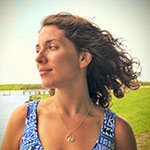If Nameless Fields Could Sing
We expected to find it
alone, just us in that sun
under the evergreens
among Zbylitowska Góra’s
enclosed grass plots marked
with names and towns
for Poles, left nameless
Hebrew text for Jews.
Instead, we walked into a forest
of flags growing wild
without roots. Young boys
with Magen Davids draped
heavy, blue stripes over white. Boys
with yarmulkes and prayer shawls
and heads covered and arms wrapped
in each other. So many young boys. A few
older ones. A rabbi. Two boys helping
another walk. A disabled boy. And another one. And then
that singing. Singing
rose like smoke.
Dai dai dai
dai dai dai
dai dai dai dai.
And one of those boys
wailed. Wailed as the rest sang.
Rocked and wailed. And they surrounded
the site
where children
are said
to have been shot.
Nameless and gone. The grass. Wild flowers and bright
butterflies. Neon green and white amid purple blooms.
And the flags.
The singing. The wailing. The rocking. The air
heavy with prayer. And a smaller group of girls.
Shoulder to shoulder, dressed in flags too and some
carrying stones and some one another and most
crying and some just standing.
But that boy’s wail cut
through huddled bodies.
The boy carried by other boys.
The boy who didn’t need
the facts. Who needed
to wail. But we are not
crying or tearing off our clothes
or lighting candles but I wish
we were. Wish I could have joined them.
Sang and swayed and
wailed. Wish that
was what we had come to do. To linger
with the unnamed on their soil. To mourn. But we
came to learn
the facts.
To know that
on the first day 6,000 were shot.
2,000 Poles, 8,000 Jews, and at least
800 children by the end of the second.
That the monument reads
“Polish Citizens”
and forgets
ethnicity.
We came to know
the dates
and times
and numbers.
To listen. But not to wail.
To hear. But not pray. To learn
without feeling.
To look for light
in the break between the trees,
where evergreens turn black
against the high-noon sun
and wailing becomes song
becomes prayer becomes
all that’s left of god.

Julia Kolchinsky Dasbach emigrated from Ukraine as a Jewish refugee when she was six years old. She is the author of three poetry collections: The Many Names for Mother, winner the Wick Poetry Prize (Kent State University Press, 2019); Don’t Touch the Bones (Lost Horse Press, 2020), winner of the 2019 Idaho Poetry Prize; and 40 WEEKS, forthcoming from YesYes Books in 2022. Her recent poems appear in POETRY, American Poetry Review, and The Nation, among others. Julia is the editor of Construction Magazine. She holds an MFA from the University of Oregon and is completing her Ph.D. at the University of Pennsylvania. She lives in Philly with her two kids, two cats, one dog, and one husband.

 BACK TO ISSUE
BACK TO ISSUE